civil war

Especially for those churches who imagine ourselves to be a mediating middle path in a country where every issue has become sharply partisan, Civil War illustrates that objectivity ends where the suffering of vulnerable people begins.

If you’ve been taught about Juneteenth at all, the common telling is that President Abraham Lincoln's 1863 Emancipation Proclamation pronounced freedom for all enslaved people in states that had seceded from the Union, but that Black Texans weren’t informed until June 19, 1865 — two and a half years later. The delay is sometimes blamed on distance and limited communication or that enslavers weren't inclined to comply with the law. While these may have been contributing factors, these explanations obscure why the Black residents of Galveston, Texas, actually celebrated the first Juneteenth — and obscures how that celebration still speaks to us today

Signer issued a statement on May 13, criticizing the torch-carrying marchers as either “profoundly ignorant” or aiming to instill fear.
“I smell Jew,” posted an anonymous Twitter user with the handle “Great Patriot Trump.” “If so, you are going back to Israel. But you will not stay in power here. Not for long.”
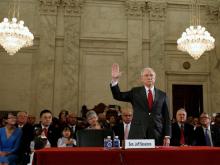
Senator Jeff Sessions of Alabama recently raised eyebrows during his confirmation hearing for attorney general when he expressed doubts that secular people respected the truth as much as did those with religious convictions. Even as he insisted that there should be no religious tests for holding public office, Sessions was queasy about the potential dangers of the secular worldview.

An American missionary priest, killed in Guatemala in 1981, has moved a step closer to being named a Catholic saint, after Pope Francis declared him the first-ever American martyr.
The Rev. Stanley Rother, a priest from the Archdiocese of Oklahoma City, served for nearly 15 years in Guatemala before being shot dead, during the country’s bloody civil war that divided the country from 1960 to 1996.

While Americans watch Hillary Clinton and Donald Trump fighting to the finish, in a noisy and polarized campaign, Germans are quietly debating their own presidential election in far different terms.
Among the names put forward as candidates are two leading Protestant bishops — one of them a woman — and even a respected Muslim writer.
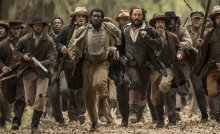
So changing our popular narrative about this era in our nation’s history means being more honest about the past. This is the admirable goal of Free State of Jones, a film about a real-life Mississippi farmer who led a rebellion against the Confederacy, made up of fellow farmers, escaped slaves, and army deserters.

It’s a long way from Hollywood, yet a swampy corner of southeast Mississippi has given the film world its latest hero — or maybe antihero.
His name is Newton Knight, born 180 years ago and played by Matthew McConaughey in the The Free State of Jones, which opened around the country on June 24.
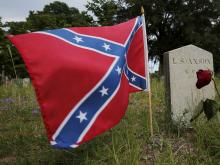
The Southern Baptist Convention, born in 1845 in a split over its support for slavery, passed a resolution calling for Christians to quit using the Confederate flag.
“We call our brothers and sisters in Christ to discontinue the display of the Confederate battle flag as a sign of solidarity of the whole Body of Christ, including our African-American brothers and sisters,” reads the resolution adopted Tuesday at the convention’s annual meeting in St. Louis.

As any Marvel’s Avengers appreciator can tell you, a staple focus of each story is on team dynamics. What does it take for a group of people with different agendas and backgrounds to effectively work together for good? How does a team find common ground, and account for each others’ strengths and weaknesses?
As anyone who’s lived in Christian community (or worked in social justice) knows, these ideas come up as much in everyday life as they do when taking down a supervillain. But what Marvel hasn’t looked at is the other side of intentional community — what happens when a team can’t work.
Until now.
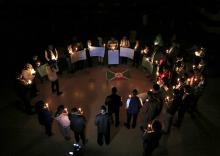
A serious breakdown between the powerful Roman Catholic Church and the government in Burundi is raising concerns over stability in the East African nation, as senior government officials accuse the church of sponsoring violence. Since April 2015, the country has been racked by chaos after President Pierre Nkurunziza agreed to run for a third term. Catholic bishops had strongly opposed the move, saying the constitution was clear that a president should serve only two terms.
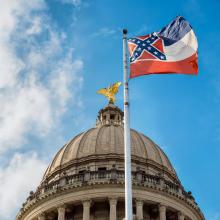
In his fathomless wisdom, the governor of Mississippi has declared April to be “Confederate Heritage Month,” though the proclamation was curiously missing from the State of Mississippi website, reports the Jackson Free Press.
Gov. Phil Bryant's proclamation — first posted on the website of the Sons of Confederate Veterans — states that “it is important for all Americans to reflect upon our nation’s past.” And what better time? After all, April 25 “is set aside as Confederate Memorial Day to honor those who served in the Confederacy” — why not give them an entire month?
1. Where Pope Francis Learned Humility
Francis’ road to humility was like the rest of ours: long, hard, and prideful.
2. The Meaning of Serena Williams: On Tennis and Black Excellence
“For black people, there is an unspoken script that demands the humble absorption of racist assaults, no matter the scale, because whites need to believe that it’s no big deal. But Serena refuses to keep to that script.”

MY GREAT-GRANDMOTHER, Elizabeth “Lizzie” Johnson, was born in 1890 in Camden, S.C., with a different last name from all the other people in her household. Three generations later, we have no idea where the name Johnson came from.
Lizzie grew up working plantation land owned by her grandmother, Lea Ballard. Lea received the land in the wake of the Civil War: We don’t know how or why, though one theory speculates that Lea, who was listed as a 42-year-old mulatto widow on the 1880 U.S. Census, may have been the daughter of her slave owner. He may have given the land to her after the Civil War. We don’t know. We only know that Lea owned it, that she had 17 children who worked that land, according to family lore, and that the city of Camden eventually stole the land from her by the power of eminent domain. This we know from records I hold in my possession.
Lizzie married a railroad man named Charles Jenkins. Lizzie and Charles had three children; Charles later died in a railroad accident. Lizzie had a choice: endure the brutality of the Jim Crow South alone with three kids, or move with the stream of black bodies migrating north. Lizzie migrated to Washington, D.C., and, eventually, to Philadelphia and took her lightest-skinned child with her.

President Obama’s political opponents are outraged over his remarks at last week’s National Prayer Breakfast comparing Islamic violence to historic Christian violence. Jim Gilmore, former chairman of the Republican National Committee, called the remarks “the most offensive I’ve ever heard a president make in my lifetime.”
But anyone who is angry with Obama’s speech must also express the same wrath toward one of the greatest presidential speeches in American history, Abraham Lincoln’s Second Inaugural Address, delivered 150 years ago next month.
Obama used his annual remarks at the National Prayer breakfast to condemn radical Islam (though he didn’t use the term). In the process, he made some more general comments about how religion has been used — both today and in the past — to promote violence.
What has rankled many conservatives is Obama’s statement that “during the Crusades and the Inquisition, people committed terrible deeds in the name of Christ.” He then brought his historical analogy closer to home:
“In our home country, slavery, and Jim Crow all too often was justified in the name of Christ.”

LAST YEAR, as I was unpacking my son’s school backpack, I found the children’s book on the Prophet Muhammad that my wife and I read to him at night. He had brought it to school without telling us. “It was for show and tell,” he explained to me.
You might think that my first reaction would be happiness. One of my goals as a Muslim parent is to help my kids feel connected to their faith. Clearly my son felt close enough to his religion to bring a book on the Prophet to share with his class.
What I actually felt was a shock of fear shoot down my spine. It was an immediate, visceral reaction. A whole slew of questions raced through my head. What did his teacher think of Muslims? What about his classmates? Would somebody say something ugly or bigoted about Islam during my son’s presentation? Would his first taste of Islamophobia come at the age of 5 during show-and-tell?
My fear at that moment is one small window into what it feels like to be a Muslim-American parent at a time when Muslim extremism is on prominent display and Islamophobia in America continues to spread.
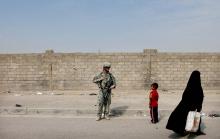
America is stunned by what is happening in Iraq right now, and happening so quickly. We may be facing the worst terrorist threat to international security so far — despite all we have done and sacrificed. Both our political leaders and media pundits are admitting there are no good options for the U.S. now. But there is an option we could try for the first time: humility. Let me turn to two biblical texts that might provide some wisdom for both the religious and non-religious.
If your enemies are hungry, feed them; if they are thirsty, give them something to drink; for by doing this you will heap burning coals on their heads. Do not be overcome by evil, but overcome evil with good. (Rom. 12:20–21)
Blessed are the peacemakers, for they will be called the children of God. (Matthew 5:9)
All nations use propaganda to tell half-truths and spread misinformation about their enemies, which should be honestly challenged. Even so, it is also true that we have real enemies in this world, as individuals, groups, and nations. To assume otherwise is foolish, from the perspective of history, certainly, but also in light of good theology about evil as part of the nature of the human condition. According to the Bible, even our faith communities will encounter enemies. Jesus’s teaching assumes that we will have enemies, and he teaches us how to treat them. In the passages above, Jesus and Paul the Apostle offer guidance for more effective ways of dealing with our enemies. It seems to be clear that our habit of going to war against them is increasingly ineffective. For the past several years, we have found ourselves in a constant state of war with “enemies” who are very hard to find or completely defeat.
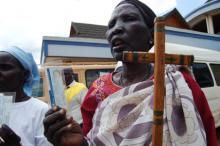
For Christians living in predominantly Muslim Sudan, travel restrictions are making life more difficult each day, a Roman Catholic cardinal said.
Sudanese Cardinal Gabriel Zubeir Wako highlighted the challenges at a Catholic Bishops Conference in Juba, the Republic of South Sudan’s capital. His auxiliary bishop could not attend the Jan. 21-30 meeting because his passport was seized by security agents, along with those of eight priests.
“Christians in the two countries are facing difficulties,” Wako told the gathering. “We [bishops] must focus on serious matters and come up with strong messages.”

IN TERMS, America has tried to heal itself. The Civil War took place in the 1860s. The civil rights movement took place in the 1960s. From America’s two biggest domestic conflicts emerge three main elements: the first, a group of people, primarily white, the majority and ruling group in society. Let’s call this group the “Land of the Free”; the second, also a group of people, but a minority, primarily black, originally from Africa, the “Other America”; and the third element of our simplified history is the slavery and poverty that divides the first group from the second and which we will call the “Wall.” ...
There are several questions I must ask myself if I am to be a Christian in America today. One that gives me a great sense of urgency is this: “If change only comes after confrontation and violence, what type of confrontation is needed to make the country livable for all people?”
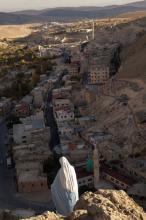
A huge statue of the Virgin Mary towers over churches, monasteries and mosques in the Syrian city of Maaloula, where a dialect of the Aramaic language of Jesus is still spoken.
The town has managed to stay out of the Syrian conflict between Sunni Muslim rebels and the regime of dictator Bashar Assad, as have most of Syria’s 2 million Christians.
But worsening violence has forced the community into a corner: Continuous clashes between the rebels and the regime in this isolated town of 2,000 people as well as other Christian towns over the past two weeks have many Christians worried that they will no longer be allowed to stay neutral.